- Home
- Vicki Delany
A Scandal in Scarlet Page 7
A Scandal in Scarlet Read online
Page 7
I doubt they would have gone that far. But Maureen quit the post, and she’s mocked and ridiculed the BIA and everyone in it ever since.
The point being, Maureen collected enemies the way some people collected Sherlock Holmes mugs or everything that had Benedict Cumberbatch’s face on it. With pride.
When Maureen and Kathy had argued over the painting, I’d been the person closest to them. Maureen had been enjoying the spat. I thought it entirely possible she found the worst painting she could to donate to the auction, hoping to get a rise out of Kathy. Squabble over, aim achieved, happy with her afternoon’s work, she’d retired in triumph to push her way into the mayor’s circle.
No, Maureen Macgregor hadn’t killed Kathy Lamb.
But others who’d overheard what went on between them might not have seen the satisfaction on Maureen’s face or known how much she enjoyed her reputation as the Curmudgeon of Baker Street and did everything she could to encourage it.
What onlookers had seen, and what they told the police, was that Kathy and Maureen had argued loudly and publicly. Kathy had not wanted Maureen’s contribution in the auction and had insulted the painting and humiliated its creator by offering a dollar fifty for it.
Even if anyone was inclined to suggest that normal people didn’t kill over an inexpensive painting, Maureen had made enough enemies over the years that no one would leap to her defense. No one in West London considered her in any way normal.
“You want Gemma to prove your innocence,” Jayne said.
Maureen nodded. I studied her face. She shifted from one foot to another. I waited. Finally, she forced the words over her tongue. “Yes, I do. P-p-please, Gemma. Can you help me?”
Moriarty leapt off the shelf. He walked over to Maureen and twisted himself between her legs. Happy to have a reason to break off eye contact, she bent over and gave him a hearty pat. He rubbed against her leg and purred loudly. She looked up and gave me a weak smile.
Little did Maureen know that if Moriarty wanted me to help her, that was an excellent reason for me not to. Moriarty and I didn’t exactly get along. He was a great shop cat. He loved everyone and everyone loved him. But for unknown reasons, he was always trying to maul the hand that feeds him. I tried not to take it personally. Other animals like me. My dog, Violet, likes me. Stray dogs have been known to fall into step beside me. Even other cats like me, as I’ve found when I’ve visited friends who have cats.
Come to think of it, the only other person Moriarty doesn’t like is Ryan Ashburton. I filed that thought away to ponder another time.
“I can’t help with this, Maureen,” I said. “I’m not involved, and I’m not planning on getting involved.”
“All I’m asking is for you to do what you did those other times. You helped Donald Morris when he was accused of killing that woman writer and Leslie Wilson when …”
I refrained from saying that I’d helped Donald and Leslie because I liked them. Instead I simply said, “No.”
She straightened, lifted her chin, and stared directly at me. “I knew this was going to be a waste of time, but I thought it’d be worth a try. It’s not true, is it, what they say about you?”
“What do they say about Gemma?” Jayne asked.
“That she’s smarter than the cops. I knew that was just talk. Simple minds assume that because you know all about Sherlock Holmes, you’re some sort of consulting detective. As usual, no one listens to me. You won’t help me because you can’t. Admit it, Gemma Doyle.”
The oldest trick in the book.
“It’s after nine,” I said. “Time to lock up.”
“The police told me I’m not to leave West London. They’ve been talking to people who know me. Asking if I have a temper. If I’ve been known to lash out in anger. They’re searching police records for dirt on me.”
“Are they going to find anything?” I asked.
“They might. They might not. I’m a respectable businesswoman, Gemma. Like you and Jayne here. I have been for a long time, but maybe I have things in my past that don’t look so good. Don’t we all?”
“I don’t,” Jayne said.
Maureen gave her a withering glare. And then she remembered she was trying to be friendly, so the glare died. “The cops want to pin this on me. I know they do. All they’re interested in is solving the case as fast as they can and getting their promotions.”
“That’s not how the West London police work,” Jayne said.
Maureen’s laugh had a history behind it. I might want to find out what that history is one day. “It’s how they all work.” She looked straight into my eyes. “They’ll find a way to blame me, and the guilty person will go free. Maybe that person will kill again. But don’t worry about it, Gemma. It won’t be your fault. Like I said, I know you’re not up to it.”
“I’ll ask a few questions,” I said. “No guarantees.”
The oldest trick in the book. And I stepped right into it.
Chapter Seven
Jayne arrived in time for breakfast on Sunday morning. I’m not much of a cook, but I pride myself on doing an excellent traditional full English breakfast.
I put a plate of grilled turkey sausages, scrambled eggs, sliced fresh tomatoes, sautéed mushrooms, and lightly buttered whole-wheat toast in front of her, and another at my place.
The Full English, adapted for modern times.
Jayne picked up her fork and dug in. “Did you change your mind overnight? About helping Maureen, I mean.”
“Sadly, no.” I sliced my sausage. Violet recovered from a bout of excessive enthusiasm at the arrival of Jayne and lay under the table, hoping for scraps to fall like manna from heaven. “I trust the West London police. I certainly trust Ryan. But it has been known for the cops to become fixated on a suspect and spend their time building a case against that person rather than searching for further suspects. Time and budgets are limited, and our chief likes a high solve rate.”
“Ryan’s not going to be happy.”
“I’m not going to get involved, as in ‘involved.’ I’ll chat to a few people in a light conversational manner and report what I learn to the officials.”
“Right. You’ll use a light conversational manner when you ask, ‘So, did you kill Kathy Lamb?’ ”
“I have been known to be subtle, Jayne.”
She popped a mushroom into her mouth and wisely refrained from answering.
I’ve found, in the few police cases I’d unwillingly been swept up in, that I’d been able to find out things the police could not. Jayne might roll her eyes at talk of a “light, conversational manner,” but people tended to guard their words carefully when being questioned by the police. Conversation among peers and acquaintances was far more likely to be unguarded. And thus more revealing.
“I phoned your mother this morning,” I said. “I asked her about the unlocked back door.”
“I know. She called me as soon as she hung up and told me not to get involved with your wild schemes.”
“Excellent advice. My mother would offer the same. She told me she honestly can’t remember if she locked the back door when she left the room to take her seat in the dining room. I’ll take that to mean she did not. In unusual surroundings, meaning not their home or place of business, a person remembers what they did more than what they did not do.”
“I’ve lost count of the number of times I’ve forgotten if I locked the tearoom and had to go back and check.”
“Exactly. Because you do it without thought, as a matter of routine. Locking up the tearoom is not part of your mother’s routine, so she would remember if she had.”
“She feels really bad about it,” Jayne said. “She thinks it’s her fault Kathy was killed.”
“It’s the fault of the killer and only the killer,” I said. “The unlocked back door, I will admit, gives me cause for concern. If Kathy was killed by someone who walked into the storage room while the rest of us were having tea, then the list of suspects grows substantially. In th
at case, it might have been an attempted robbery gone wrong. A summary of the sort of items being offered at the auction was publicized widely, although not the prices.”
“Can you check into the West London underworld and see if there was talk?” Jayne said.
I raised one eyebrow. “The West London underworld? I don’t even know if there is such a thing. I suspect not.”
“Oh.”
“It’s possible someone might have specifically been after The Valley of Fear. I’ll ask Uncle Arthur to ask his contacts in the illicit rare book world.”
“Arthur Doyle has contacts who deal in stolen books?”
“Arthur Doyle,” I said, “has contacts everywhere.”
“Oh. I wish I didn’t know that.”
“What is learned cannot be unlearned.” I gave her a smile. “But you needn’t worry. He once helped a man who was accused of stealing from a notoriously unstable collector. They’ve been friends ever since.”
“Arthur proved his innocence?”
“Oh no. The man wasn’t innocent at all. I think he still has the book. Arthur was able to shift suspicion to an even more notorious and unstable collector. He completely destroyed an infamous crime family while he was at it. You might have read about that in the papers.”
Jayne gaped at me.
“More toast?”
“What? Oh, toast. No thanks. This is good. You’re a better cook than you take credit for.” She scooped mushrooms onto her eggs and took a mouthful.
“Every Englishwoman can make a proper English breakfast. Even my mother didn’t burn the sausages. Occasionally.”
“I guess our visit to the beach is off.”
“Afraid so. Eat up and we can go. Good thing we planned to take the day off. Detecting, I’ve found, interferes with running a business.” I carried my plate to the sink. “If you want to come with me, that is. Don’t feel that you have to. I suggested a day off because you need a break. I don’t want you to waste it running around West London on what might be a goose chase.”
She popped a tiny heirloom cherry tomato into her mouth. “Gemma, I don’t dare leave you alone. I hate to think what trouble you might get into without me. Need I remind you, there’s a killer out there?”
“That,” I said, “I am unlikely to forget.”
“Where are we going to start?”
“I sensed a great deal of tension in that room yesterday, aside from the presence of Maureen.”
Jayne nodded. “Conflict in the ranks, I’d say.”
“As well as among the museum volunteers, there was dissent between Dan Lamb and his new wife, which implies dissent between them and Kathy. Jock O’Callaghan and Elizabeth Dumont clearly have a history, but that’s likely not to have anything to do with Kathy’s death. I’m going to start with the museum. Kathy wasn’t popular with everyone there. She only assumed control of the board recently, and I overheard talk yesterday of volunteers who quit when Kathy took over.”
“We’re going to assume this wasn’t a random theft gone wrong, then?” Jayne said.
“You told Ryan you had two of those hanging teapot decorations—is that right?”
“Yes.”
“It would be beyond coincidence for the thief to wander in the back door and just happen to have a similar item in his or her pocket. One was taken off the wall, and one remained. The thief must have grabbed it as he, or she, went past. Whether they intended to use it as they did isn’t for us to say, but that eliminates, at least for now, the idea that someone came in the back door, intending to steal whatever they could grab.”
“Why are we helping Maureen, anyway? It seems entirely possible that she killed Kathy. I saw her in the hallway only minutes before we went into the storage room.”
“Lots of people were in the hallway, using the loo or checking out the items for sale. That’s part of the problem. Everyone in the room, with the possible exception of Jock O’Callaghan’s elderly mother, was milling about while we waited for the auction to start. I don’t like Maureen more than anyone else in town does, but I believe she’s innocent. In this at least,” I explained my reasoning to Jayne.
“Makes sense,” she said, mopping up the last of the eggs with her toast.
* * *
Although Scarlet House is only a short walk from my house, we took the Miata, leaving a sad-faced Violet peering out the window after us. In case the museum visit led to other calls, I didn’t want to have to come back for the car.
It was shortly after ten o’clock, and the tourists were out in force. Traffic moved slowly as they headed for the beach or Sunday brunch, and the boardwalk was crowded with people shopping for fresh fish, eating ice cream, or watching seals play in the cool waters under the pier.
I pulled into the parking lot off Harbor Road. Signs informed me that the main museum house was closed, but the barn and grounds were open. It was Sunday, so no one was working on the house, but the repairs and restoration had begun. Scaffolding covered the front and one side wall.
“It’s too bad what happened,” Jayne said. “They can restore the house, but it won’t be the same if it’s not original. Has anyone wondered if the fire was connected to Kathy’s murder? They said it was an accident, but maybe it wasn’t.”
“I did think about that,” I said. “I’ll have to ask Ryan. The arson investigator might want to look at it again in light of Kathy’s death. If she had enemies at the museum, perhaps they set the fire, hoping it would look as though it was her fault. When that didn’t work …” I let the sentence trail off, and we got out of the car.
A man came out of the barn, a lamb and a pack of excited toddlers chasing after him. “Mornin’,” he said, touching the edge of his floppy-brimmed hat. He wore the clothes of a Colonial-era farmer: dusty white shirt with sleeves rolled up, a brown leather vest, dark baggy trousers that ended at the knees, black stockings, and shoes with buckles. “This little guy,” he said to the children, “is a late lamb. She arrived long after most of the other lambs, which were born in the spring.” He carried a baby’s bottle. “Would you like to feed her?” He handed the bottle to a young girl. She took it, held it out, and the lamb latched on immediately. The girl giggled so hard her pigtails bounced.
I felt myself smiling. One of the kids carried a round flat rock. He put it in his mouth and took a bite. A piece broke off, and he chewed. Not a rock then, but an attempt at baking by someone without Jayne’s skill. “Yuk,” he said. He spat it out and dropped the remainder to the ground. We heard voices from inside the barn, and Jayne and I slipped in. The barn was dark and cool and smelled of clean straw and well-cared-for animals.
“Welcome.” A group of adults stood around a woman dressed in a long brown dress under a white apron, with a white bonnet on her head. “Why it’s my friends Goody Doyle and Goody Wilson,” she said. “Ladies, please join us.”
The modern-clothed group nodded politely. The costumed woman was Sharon Musgrave, Chipmunk-woman who’d sat at our table yesterday.
“Are we being particularly good today?” I whispered to Jayne.
“Goody means ‘goodwife.’ The Puritan version of Mrs.”
“Don’t think I care much for that form of address,” I said. “Sounds like something I’m expected to live up to.”
“I was explaining to these out-of-time visitors,” Sharon said, “that because the house is temporarily uninhabitable, we’re living in the barn. I do miss my lovely, soft four-poster bed, the one my husband and sons made with their own hands, and my big fireplace, but we know how to make do in 1648.” She smiled at us. Gone was Chipmunk-woman, nervous, awkward. In her place was Goodwife Musgrave. Strong, confident, proud—a woman who knew how to make do.
“Oh, my gosh, Madison! I’d better check on the kids.” A man ran out of the barn.
The women thanked Sharon and followed him.
“This looks interesting,” I said.
Sharon beamed. “Every cloud has a silver lining, doesn’t it? Terrible what happened to
the house, but I love the opportunity to be as industrious as our ancestors had to be.” She spread her arms to take in the barn. “We can make this perfectly habitable while the repairs are being done.”
The small enclosures for the animals took up half the barn. Two goats gave me suspicious looks across their gate. A huge pig nursed eight tiny, squealing, pink bundles. The rest of the barn was used to store equipment and sacks of feed. The floor had been thoroughly swept, pallets with straw mattresses placed against the wall, and a rough-hewn table with four equally rough stools placed in the center of the space. Stones were piled to make a hearth, and a big iron pot rested on a rack placed above the fire. I smelled cooking vegetables and a rich broth. “Chicken stew for dinner,” Sharon said. “With biscuits freshly made over an open fire. Not as convenient as an oven, but they’ll be just as tasty.” She smiled at us. Her bonnet was starched to within an inch of its life, and her apron as white as new-fallen snow. Her dress fell to about a half an inch off the ground, but the hem was clean, as were her shoes. A discreet red badge with the Scarlet House logo was pinned to her apron, the only touch of color on her. “I sometimes think we’ve missed so much in the rush to industrialization.”
Goody Musgrave, I thought, was living in a fantasy world as complete as Disneyland.
The straw in the pens was fresh, the floor clean, the goats and pigs glistening as though they’d had a bath this morning. I doubted that the flour for her biscuits had maggots or grit mixed in with it or that she’d chased, killed, and plucked the chicken to throw in the pot. If the vegetables weren’t ready for harvest, she’d go to the supermarket, and if their pigs died, there was always the butcher shop on Baker Street.

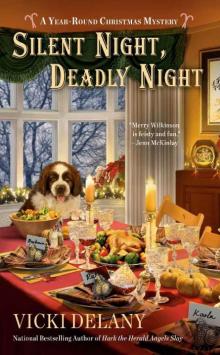 Silent Night, Deadly Night
Silent Night, Deadly Night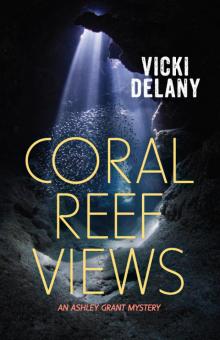 Coral Reef Views
Coral Reef Views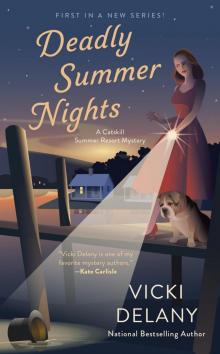 Deadly Summer Nights
Deadly Summer Nights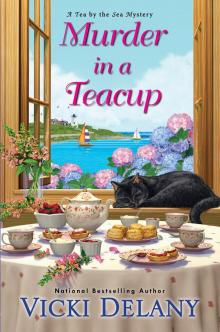 Murder in a Teacup
Murder in a Teacup Whiteout
Whiteout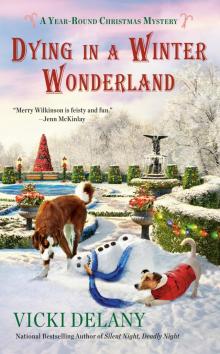 Dying in a Winter Wonderland
Dying in a Winter Wonderland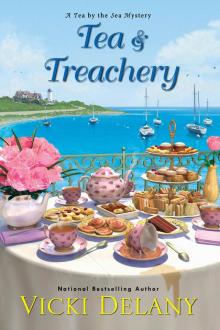 Tea & Treachery
Tea & Treachery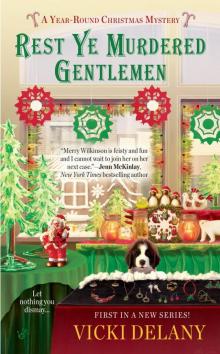 Rest Ye Murdered Gentlemen
Rest Ye Murdered Gentlemen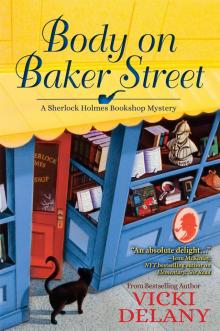 Body on Baker Street: A Sherlock Holmes Bookshop Mystery
Body on Baker Street: A Sherlock Holmes Bookshop Mystery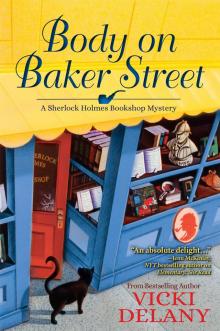 Body on Baker Street
Body on Baker Street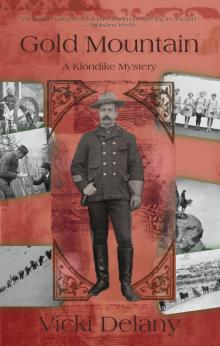 Gold Mountain
Gold Mountain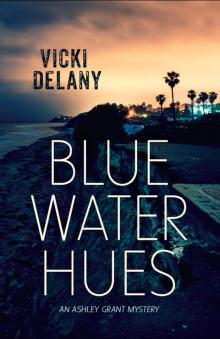 Blue Water Hues
Blue Water Hues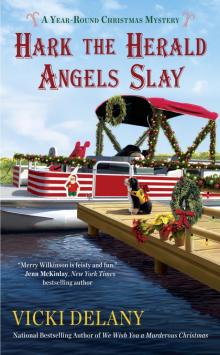 Hark the Herald Angels Slay
Hark the Herald Angels Slay Murder at Lost Dog Lake
Murder at Lost Dog Lake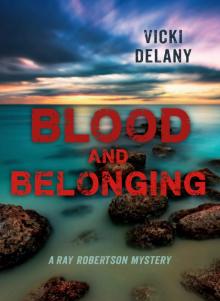 Blood and Belonging
Blood and Belonging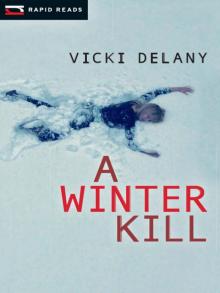 A Winter Kill
A Winter Kill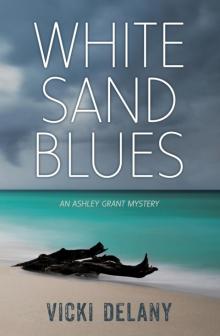 White Sand Blues
White Sand Blues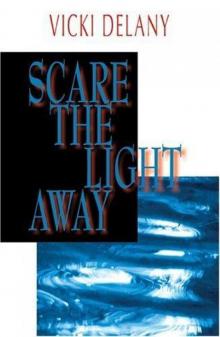 Scare the Light Away
Scare the Light Away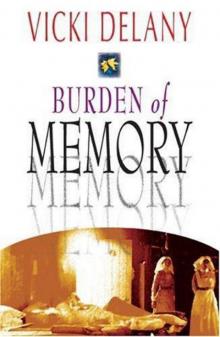 Burden of Memory
Burden of Memory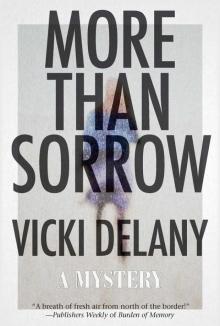 More Than Sorrow
More Than Sorrow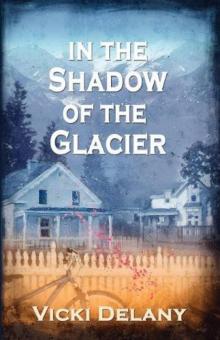 In the Shadow of the Glacier
In the Shadow of the Glacier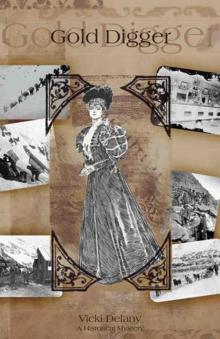 Gold Digger: A Klondike Mystery
Gold Digger: A Klondike Mystery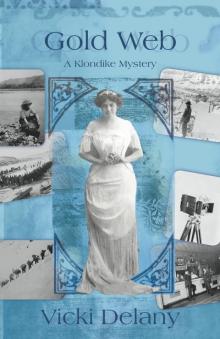 Gold Web
Gold Web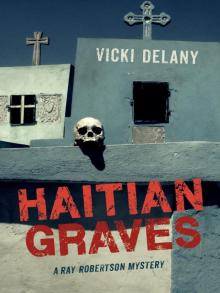 Haitian Graves
Haitian Graves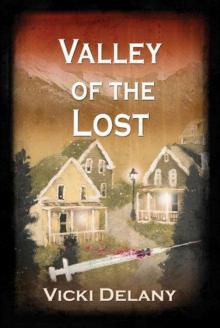 Valley of the Lost
Valley of the Lost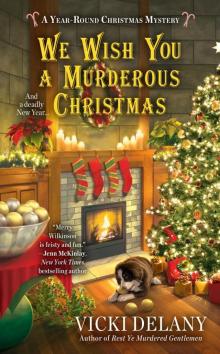 We Wish You a Murderous Christmas
We Wish You a Murderous Christmas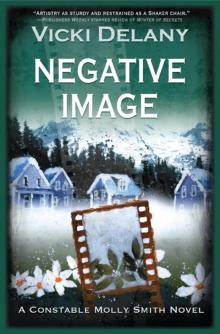 Negative Image
Negative Image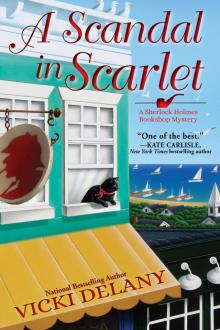 A Scandal in Scarlet
A Scandal in Scarlet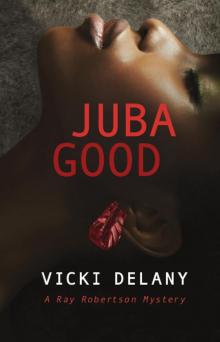 Juba Good
Juba Good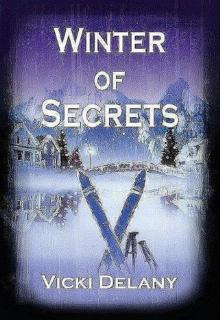 Winter of Secrets
Winter of Secrets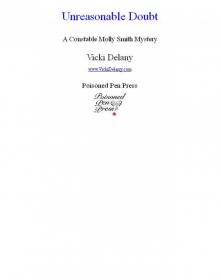 Unreasonable Doubt
Unreasonable Doubt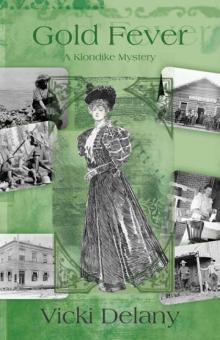 Gold Fever
Gold Fever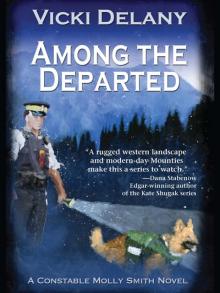 Among the Departed
Among the Departed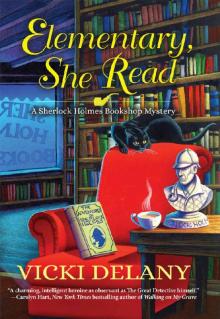 Elementary, She Read: A Sherlock Holmes Bookshop Mystery
Elementary, She Read: A Sherlock Holmes Bookshop Mystery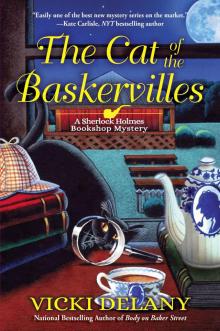 The Cat of the Baskervilles
The Cat of the Baskervilles